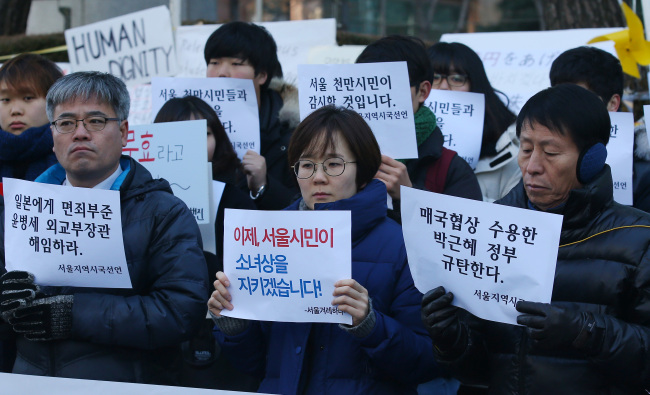Two weeks after South Korea and Japan reached a landmark deal over Japan’s sexual enslavement of Korean women during World War II, lawyers and scholars remain split over the legitimacy of the bilateral settlement.
A progressive lawyers’ group claimed that the deal was invalid according to international law, while other experts pointed out that the agreement between two governments carries legal obligations. Some also questioned the agreement as conflicting with domestic laws.
“Putting aside the contents, the deal itself has no legally binding power according to international law, as there was no exchange of documents or letters,” Song Ki-ho, from the Lawyers for a Democratic Society, told The Korea Herald. “Therefore, the deal with Japan is not a legal treaty.”
He cited the Vienna Convention on the Law of Treaties -- regulating international law on treaties between states -- which stipulates that a treaty is defined as an agreement concluded between countries in written form and governed by international law.
The remarks came after the Ministry of Foreign Affairs confirmed that there was no exchange of documents or letters for the deal between Tokyo and Seoul. The lawyers’ group earlier requested the authorities disclose the written form of the agreement to see whether the deal could be seen as a legally binding treaty.
In the diplomatic deal defined as “final and irreversible” by both countries, Japanese Prime Minister Shinzo Abe promised Japan would pay 1 billion yen ($8.45 million) to a foundation for the 46 surviving victims. In return, Seoul promised not to raise the issue again on the world stage if Tokyo fulfills its commitments.
The deal has faced public backlash, with claims the government failed to fully represent the interests of the victims for the sake of hastily reaching an agreement.
A progressive lawyers’ group claimed that the deal was invalid according to international law, while other experts pointed out that the agreement between two governments carries legal obligations. Some also questioned the agreement as conflicting with domestic laws.
“Putting aside the contents, the deal itself has no legally binding power according to international law, as there was no exchange of documents or letters,” Song Ki-ho, from the Lawyers for a Democratic Society, told The Korea Herald. “Therefore, the deal with Japan is not a legal treaty.”
He cited the Vienna Convention on the Law of Treaties -- regulating international law on treaties between states -- which stipulates that a treaty is defined as an agreement concluded between countries in written form and governed by international law.
The remarks came after the Ministry of Foreign Affairs confirmed that there was no exchange of documents or letters for the deal between Tokyo and Seoul. The lawyers’ group earlier requested the authorities disclose the written form of the agreement to see whether the deal could be seen as a legally binding treaty.
In the diplomatic deal defined as “final and irreversible” by both countries, Japanese Prime Minister Shinzo Abe promised Japan would pay 1 billion yen ($8.45 million) to a foundation for the 46 surviving victims. In return, Seoul promised not to raise the issue again on the world stage if Tokyo fulfills its commitments.
The deal has faced public backlash, with claims the government failed to fully represent the interests of the victims for the sake of hastily reaching an agreement.

“Both governments appeared to declare the resolution of the issue in the form of international promise or assurance, but the sex slavery issue in nature cannot be solved irreversibly and finally,” Song said. “The South Korean government has no right to declare the final and irreversible resolution of the issue.”
The United Nations’ General Assembly passed a resolution on the basic principles for the victims of human rights violations in 2005, making it an international responsibility to protect war crime victims’ honor and rights to compensation.
“As the agreement is not legally effective, Korea has no duty to stick to it and the nation can anytime withdraw from the settlement,” he said.
But Cho Jung-hyun, a law professor from Hankuk University of Foreign Studies, pointed out that the deal might not be a treaty under international law, but both governments have legal responsibility to follow it.
“Though not in written form, the two governments officially announced the settlement,” Cho told The Korea Herald. “So they have legal obligation to abide by the settlement based on diplomatic trust.”
“But the scope of the government’s authority can be questioned,” he said. “The deal might mean that two countries agreed to end the dispute over the sex slavery issue once and for all at the national level. But it would not necessarily mean that the Korean government will stop individuals from raising the issue and demanding compensation.”
Lee Chang-hee, an honorary law professor from Hankuk University of Foreign Studies, took issue with the deal’s binding power under domestic law as well.
“The agreement was made between foreign ministries without consulting the National Assembly,” Lee said. “If the agreement were to be legally binding in the country, the parliament should approve it.”
Citing the Constitutional Court’s ruling in 2011, the senior scholar criticized the government for dodging its responsibility to take action on behalf of the victims forced into sexual servitude for the Japanese military.
In the ruling, the top court said that the government violated the constitutional rights of the victims by failing to address them on the world stage and help them in getting compensation from Japan.
By Ock Hyun-ju (laeticia.ock@heraldcorp.com)



















